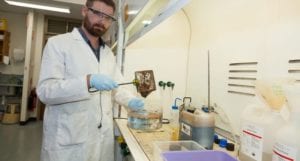Researchers have found a way to turn waste cooking oil collected from cafes and restaurants into a slow release fertilizer that results in better plant health and less wasted nutrients.
The fertiliser uses the waste canola oil and sulphur, a waste product from the petroleum industry, to form a degradable polymer coating to encase each fertiliser pellet.
Dr Justin Chalker, lead researcher of the study, says the food waste product could make an important contribution to the circular economy.
Biodegradable
“You can use it for frying up food and then you can use it again for something that’s used to grow more food,” he explains.
Dr Chalker and his team developed the fertilizer at the Institute for NanoScale Science and Technology at Flinders University in South Australia.
“What’s unique about our material compared to other slow release fertilisers is the material that holds in the nutrients is made entirely from waste and we show in this paper that it can degrade, which is important for the long-term persistence of this material whether it’s in potted plants or the environment,” he notes.
Tried and tested
The team tested the fertilizer on tomato plants and found that the nutrients were released in a controlled fashion, resulting in less wasted fertiliser and better health for the plants growing in this soil.
Dr Chalker says larger scale trials would now be conducted to see if a similar fertiliser could be produced for other crops such as grains.
He says the polymer could potentially be made from other plant-based oils such as sunflower oil or olive oil as long as they were unsaturated oils.
Finding commercial appeal
Dr Chalker and his team have been developing polymers from waste cooking oil for several years and have also invented a product to remove mercury from contaminated soils and another to clean up oil spills.
“If you want to have tangible impact where people are using your discoveries they really need to be made on-scale and they need to be able to be commercialised,” he explains
“We hope that they’ll all be successful and we have active projects in all of these areas and applications so we will wait and see what the market pull and the appetite is for each of those applications,” he concludes.







